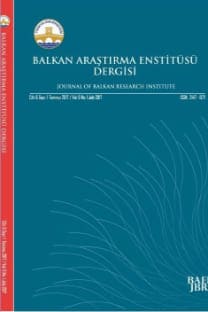Adalet ve Kalkınma Partisi Dönemi Türkiye-Bulgaristan İlişkileri (2002-2015)
Komşu iki ülke olarak Türkiye ile Bulgaristan siyasi, ekonomik, kültürel, coğrafi ve beşeri gerekçelerle birbirleri için stratejik açıdan önem taşımaktadır. Tarihsel süreç içerisinde yaşanan olaylar taraflar arasında güven problemi oluşturmuşsa da Todor Jivkov sonrası dönemde Bulgaristan’ın iç ve dış politikasında meydana gelen yapısal değişimlerin de etkisiyle ikili ilişkilerde siyasi, askeri ve ekonomik açıdan olumlu gelişmeler yaşanmıştır. Bu durumun oluşmasında Sofya yönetiminin Bulgaristan’daki Türklere yönelik 1980’li yıllarda izlediği asimilasyon politikasını terk etmesi ana etken olmuştur. Jivkov sonrası dönemde hızlı bir gelişme evresine giren ikili ilişkiler, 2000’li yıllarda da bu gidişatını sürdürmüştür. Bu çalışmanın amacı Adalet ve Kalkınma Partisi (Ak Parti) döneminde Türkiye-Bulgaristan ilişkilerini siyasi, askeri, ekonomik ve Türk azınlık boyutlarıyla incelemektir
Anahtar Kelimeler:
Türkiye, Bulgaristan, Adalet ve Kalkınma Partisi, Türk Azınlık, İkili İlişkiler.
TURKEY-BULGARIA RELATIONS IN THE PERIOD OF JUSTICE AND DEVELOPMENT PARTY (2002-2015)
Turkey and Bulgaria, being two neighbor countries, have strategical importance for each other in terms of political, economic, cultural, geographical and social aspects. Although the incidents in the historical process create a confidence problem, there have been positive political, military and economic developments in bilateral relations because of the structural changes in foreign and internal policies of Bulgaria after the end of Todor Zhivkov regime. In this, Bulgaria’s renunciation of the assimilation policies towards Turks in 1980s has been main factor in that regard. The bilateral relations have developed rapidly after the Zhivkov period and this trend continued in 2000’s as well. The aim of this study is to examine the relations between Turkey and Bulgaria with the political, military, economic and Turkish minority dimensions in the period of Justice and Development Party (Ak Party)
- ISSN: 2147-1371
- Yayın Aralığı: Yılda 2 Sayı
- Başlangıç: 2012
- Yayıncı: Trakya Üniversitesi
Sayıdaki Diğer Makaleler
Karadağ’da Osmanlı Hakimiyetinin Zayıflaması (17. ve 18. Yüzyıllar)
Adalet ve Kalkınma Partisi Dönemi Türkiye-Bulgaristan İlişkileri (2002-2015)
Arnavut Kültür ve Edebiyatında Mevlid Yazma Geleneği
Osmanlılar ve Rumeli Uç Beyleri “Merkez ve Uç”
Soğuk Savaş Döneminde Türkiye-Macaristan İlişkileri
BALKAN GEZİ NOTLARI – III Balkanlarda Unutulmuş Kadîm Bir Sevgili: Elbasan
EDİRNE BULGAR KATOLİK MEKTEBİ’NDEN BİR LEH PEDERİN 93 HARBİ NOTLARI
